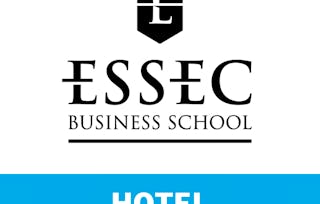With a fixed capacity, a highly disposable product and high fixed costs, hotels are a natural candidate for the application of revenue management. Originally developed by the airlines in the 1970s, these analytics-based techniques help predict consumer behavior at the hotel’s market level so that the hotel can sell each room each night at the optimum price.

Gain next-level skills with Coursera Plus for $199 (regularly $399). Save now.

The Fundamentals of Revenue Management: The Cornerstone of Revenue Strategy
This course is part of Hotel Management: Distribution, Revenue and Demand Management Specialization



Instructors: Peter O'Connor
33,307 already enrolled
Included with
(1,088 reviews)
Skills you'll gain
Details to know

Add to your LinkedIn profile
11 assignments
See how employees at top companies are mastering in-demand skills

Build your subject-matter expertise
- Learn new concepts from industry experts
- Gain a foundational understanding of a subject or tool
- Develop job-relevant skills with hands-on projects
- Earn a shareable career certificate

There are 4 modules in this course
Welcome! In this first module, you will understand what revenue management is, why it’s important, simple steps to get started, how revenue management can increase profit through booking curve management and how effective yielding can improve a hotel’s profits. Moving forward, we’ll share best practices and better prepare you for today’s complex digital age.
What's included
11 videos4 readings3 assignments
In this second module we will discuss segmentation 101, four things to consider while determining segmentation, as well as our best practices in regards to working with properties who need to go through a re-segmentation exercise, and presenting you with some key takeaways.
What's included
9 videos1 reading2 assignments
In this third module, you will have an overview of forecasting and its basic terminology, explore forecasting goals, trends and tools, and understand how to link forecasting and budgeting together.
What's included
11 videos1 reading3 assignments
This last module should help tie together concepts from the previous three modules to give you a practical understanding of the fundamentals of revenue management. You will understand why pricing is important, the difference between common pricing strategies, and what are the 7 most common pricing mistakes. After that we will revisit the topic of Big Data, automated systems, and system connectivity as it and discuss best practices for pricing.
What's included
7 videos2 readings3 assignments
Earn a career certificate
Add this credential to your LinkedIn profile, resume, or CV. Share it on social media and in your performance review.
Instructors

Offered by
Explore more from Business Strategy

ESSEC Business School

ESSEC Business School

ESSEC Business School
Why people choose Coursera for their career




Learner reviews
1,088 reviews
- 5 stars
70.70%
- 4 stars
20.20%
- 3 stars
5.78%
- 2 stars
1.56%
- 1 star
1.74%
Showing 3 of 1088
Reviewed on Jun 16, 2020
Very thorough course on Revenue Management. Liked the structure of the course as well as the pace. A lot of content was explained in a short amount of time.
Reviewed on Mar 21, 2022
The video's helped the format of learning with the diagrams.I have learned some new techniques and will use the lessons in my way of thinking (not only for hotels) .
Reviewed on Apr 26, 2021
Good course. To be honest, I didn't like the final exam. I think the exercises are too simplified and have a lot of assumptions, specially for the elasticity of demand of some customer segments

Open new doors with Coursera Plus
Unlimited access to 10,000+ world-class courses, hands-on projects, and job-ready certificate programs - all included in your subscription
Advance your career with an online degree
Earn a degree from world-class universities - 100% online
Join over 3,400 global companies that choose Coursera for Business
Upskill your employees to excel in the digital economy
Frequently asked questions
To access the course materials, assignments and to earn a Certificate, you will need to purchase the Certificate experience when you enroll in a course. You can try a Free Trial instead, or apply for Financial Aid. The course may offer 'Full Course, No Certificate' instead. This option lets you see all course materials, submit required assessments, and get a final grade. This also means that you will not be able to purchase a Certificate experience.
When you enroll in the course, you get access to all of the courses in the Specialization, and you earn a certificate when you complete the work. Your electronic Certificate will be added to your Accomplishments page - from there, you can print your Certificate or add it to your LinkedIn profile.
Yes. In select learning programs, you can apply for financial aid or a scholarship if you can’t afford the enrollment fee. If fin aid or scholarship is available for your learning program selection, you’ll find a link to apply on the description page.
More questions
Financial aid available,

